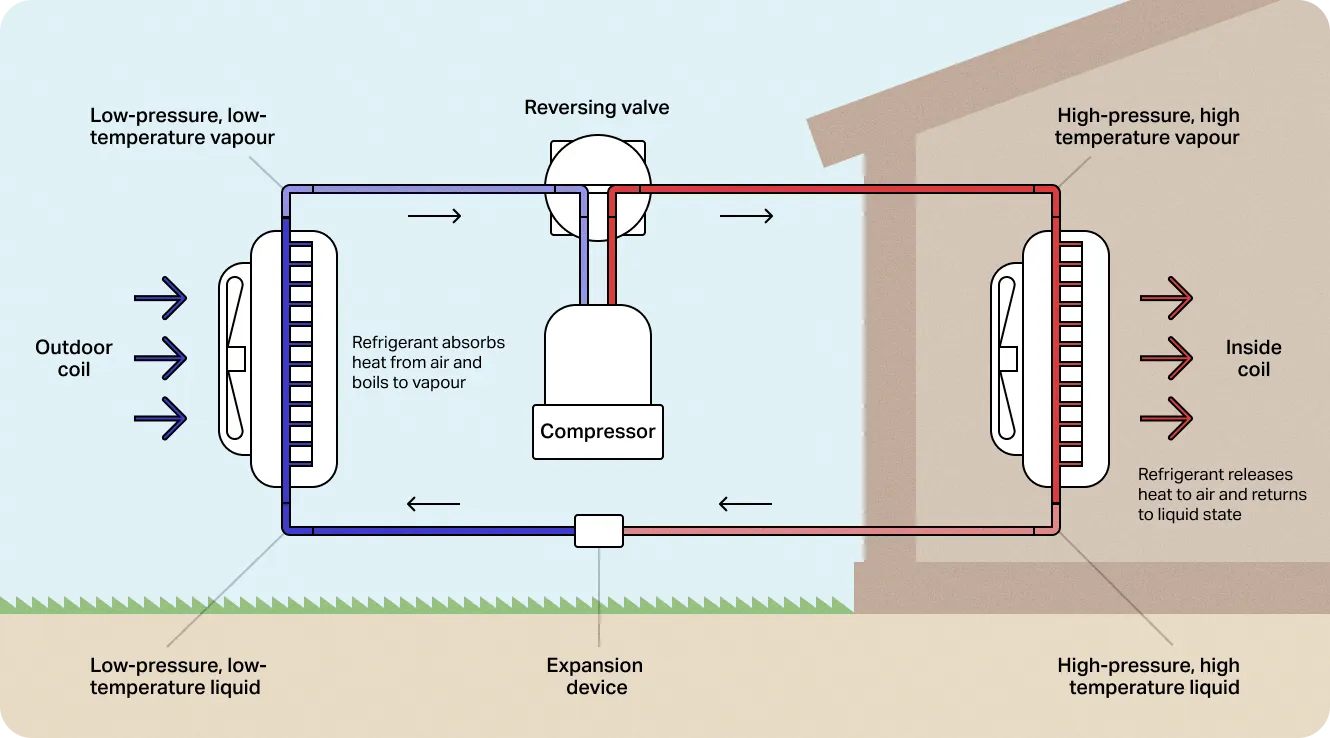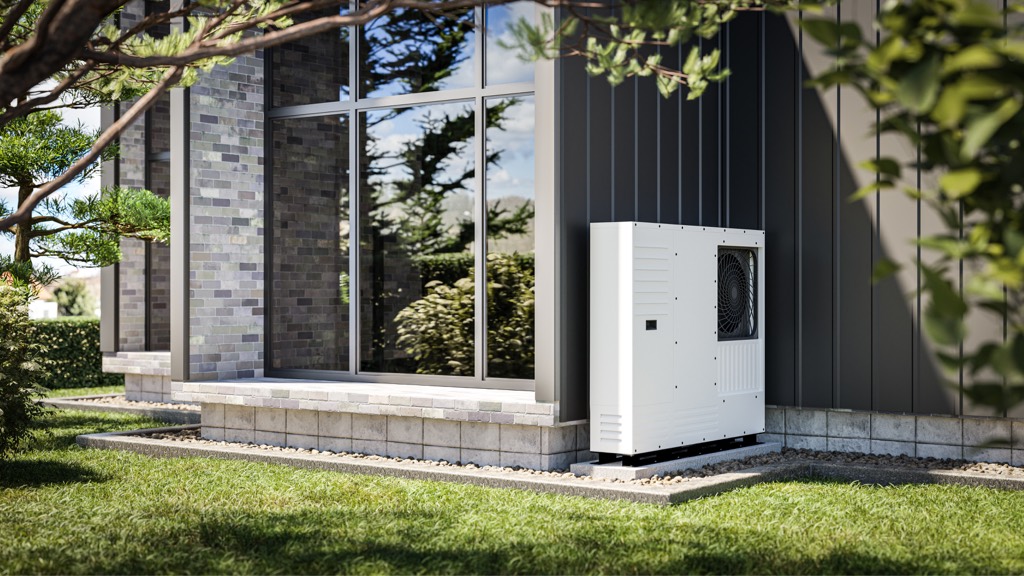How an air source heat pump works
You can heat and supply hot water to your home with the help of an air source heat pump. An air source heat pump extracts heat from the outdoor air and uses this to heat your home. These systems have proved themselves to be very successful, no matter how cold the weather it. They can absorb heat from temperatures as low as -15°C.
Through the use of radiators or underfloor heating, these systems heat your indoor spaces by transferring heat from the outside air to water. For your bath, showers, and hot taps, it can also heat water in a hot water cylinder.
Although they do use some power to operate, air source heat pumps are recognised as an energy-efficient type of heating. They produce more renewable heat than they consume. Because of this, air source heat pumps are incredibly effective at heating homes.
Types of air source heat pumps
Air source heat pumps are similar to a refrigerator. They use energy to transmit heat from a cool environment to a warm one. They are more energy efficient than traditional systems because they transfer heat rather than produce it. The UK has two widely used types:
Air to air heat pumps:
Air serves as both a heat source and a heating element in air-to-air heat pumps. The most typical examples of these are air conditioning systems for homes and businesses. We can use these systems for cooling or heating because they are programmable. Air-to-air heat pumps are energy-efficient air conditioners with lower installations and up-front expenses than other heat pump systems. They are suitable for use in most of the country. They can provide adequate heating and cooling in temperate climates.
Air to water heat pumps:
In the UK, “air-to-water” systems are the most common. They are similar to a traditional central heating system. But instead of burning fuel directly to heat water, they transfer heat from outside the home to inside to heat the water instead.
Since they generate milder heat than typical gas or oil boilers, air to water systems generally require larger radiators or underfloor heating. They need a large surface area to discharge the heat for the best results. When building a new home or upgrading an existing one, it is easier to integrate larger radiators or underfloor heating for a heat pump. It is often more expensive to install this later.
Be sure to take advice before making any decisions. You need to ensure you fully understand the climate your property is in, your budget, your requirements, and of course the possible location of your heat pump before selecting any system.

Differences between air source heat pumps and a traditional gas boiler
The majority of UK households currently use a gas boiler for heating and hot water. Although some boilers use oil, electricity, or renewable fuels like wood pellets, gas is the most popular fuel in the UK. A gas boilers burns gas to heat water. This water is then used for showers and baths and passed through radiators to heat the home.
They may have a different appearance from conventional boilers but heat pumps ultimately serve the same purpose. They produce heat and use this to warm the house and provide hot water. Heat pumps absorb heat from the air or the earth and transfer it to a coolant that compresses it. Once the water reaches a sufficiently high temperature you can use it in an air-to-air or air-to-water system (see above).
The following are a few of the main differences between air source heat pumps and traditional heating systems:
- Compared to traditional gas boilers, heat pumps are more expensive to install. A gas boiler can cost anywhere between £1,000 and £4,000 all-in. The price of a new air source heat pump will probably range from £7,000 to £13,000. But numerous government grants for renewable energy help cover the cost of making the conversion to a heat pump making them very affordable.
- Gas boilers were traditionally less expensive to operate than electric heating appliances. Heat pumps, on the other hand, are cheaper than gas boilers, according to recent research by the Regulatory Assistance Project (RAP).
- Boilers are commonplace for most of us. Because of this we might feel a little nervous at the thought of installing of a different kind of heating system. A new boiler doesn’t require much acclimatisation but purchasing a heat pump requires thorough knowledge of how it operates.
- A boiler typically lasts between 10 to 15 years. A boiler’s lifespan can be increased by having a professional service once a year. Heat pumps can continue to heat a home for more than 20 years, possibly 30 if they are being properly maintained.
- Air source heat pumps are low-carbon heating systems that do not continuously emit CO2 into the atmosphere as gas boilers do. Heat pumps operate with very low emissions thanks to their 300-400 percent efficiency. For comparison, consider that the emissions intensity of a gas boiler that is 85% efficient is 0.215 kilograms of CO2 comparable per kWh (kgCO2e/kWh), which is more than 5 times that of an air source heat pump.
Why should you consider an air source heat pump?
Air source heat pumps are more efficient than gas boilers.
The main advantages to installing and running an Air Source Heat Pump are:
- Save money on energy bills. Having an air source heat pump fitted means you will spend less money on your energy bills as you are using the outside air for heating, rather than using energy from your energy supplier. They do require a small amount of electricity to run, but the cost of this will be easily recouped by having lower energy bills.
- Lower carbon footprint. Air source heat pumps are a form of low carbon heating, because they don’t rely on the burning of fossil fuels to produce energy to heat your home.
- Easy to install. Compared to ground source heat pumps, which require digging up your garden, air source heat pumps are very easy to install. It doesn’t require planning permission (which is always a win) and can be done in a short space of time.
- Low maintenance. They require servicing by a professional installer once a year, but aside from that most maintenance tasks can be done yourself. This will include jobs such as cleaning filters, checking for leaks, checking refrigerant levels and clearing leaves, dirt and debris from your pump.
- Long lifespan. Air source heat pumps last a long time and, with proper maintenance, can last 20-30 years.
- Can be used for cooling too. If you choose an air-to-air heat pump you can use it to cool and circulate air around your home during the summer months. With temperatures on the rise, this could be a big benefit.
The potential savings from an air source heat pump
Depending on how you heat your home (whether it be by gas, oil, LPG, or electric) replacing your current setup could save you up to £1,400 a year. Below is a breakdown of the potential savings. This shows the potential annual saving when installing a standard air source heat pump in an average sized, four-bedroom detached home. Figures courtesy of Energy Saving Trust website)
| Old (G-rated) gas boiler | £910 |
| Old (G-rated) oil boiler | £2,200 |
| New electric storage heaters | £1,000 |
| Old electric storage heaters | £1,900 |
| Old (G-rated) LPG boiler | £3,400 |
Conclusion
There are more than 30 million homes in Britain, each one using an ever increasing amount of energy every day. In 2012 households spent a total of £33.4 billion pounds on energy to heat and run their homes.
That’s a huge amount of energy. With the rising cost of fossil fuels like oil and gas it’s no wonder millions of families are looking to reduce their heating and hot water bills. Moreover, the rise of fuel bills is actually pushing some households into fuel poverty.
We simply can’t keep using oil and gas indefinitely. We have to switch to clean renewable energy sources. This is why we think an air source heat pump is the one of the best solutions out there.

